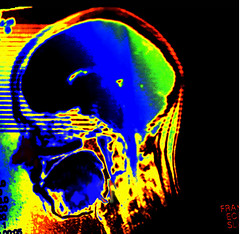 I'm about half way through an interesting book called iBrain: Surviving the Technological Alteration of the Modern Mind by Gary Small and Gigi Vorgan (Thanks to Dave Black for mentioning it in a Twitter post).
I'm about half way through an interesting book called iBrain: Surviving the Technological Alteration of the Modern Mind by Gary Small and Gigi Vorgan (Thanks to Dave Black for mentioning it in a Twitter post).Was intrigued to read that the technology revolution isn't the greatest thing to have happened to the human brain since sliced bread! The first six chapters outline volumes of research from universities, organizations, and foundations regarding technology use and its effect on the human brain. Frankly, the book puts forth some information that sounds a bit troubling.
Hearing that technology use by young children causes underlying symptoms that are consistent with autism is very unnerving information to a technology coordinator. I've spent my 11 year career convincing teachers, administrators, and school boards that the computer and other technologies are such transformative tools that students shouldn't learn with out them! Now brain research is telling use that we are causing autism, aspergers, ADHD, and ADD! Has our pendulum swung too far to the side of technology use, away from face to face interactions that we are raising up a generation with under developed interpersonal skills (making and maintaining eye contact with individuals; recognizing, analyzing, and deciphering body language cues; able to delay gratification; generally being a "people person")?
Mind you, this research isn't based on anecdotal evidence and surveys, it's done by observation and repetition within the context of a PET scan or fMRI (functional MRI--where they can scan the brain in the process of working). That's hard to argue with.
Despite all the negatives, I'm not ready to to hang up the proverbial cleats yet!. The authors do go into great detail about the positives of the digital/media revolution, but they have strong words of caution.
The book is not anti technology, but it brings up many great points that all teachers, parents, and concerned citizens should be aware of. The number one finding: BALANCE!
God calls us as Christians to lead a balanced life!
After googling "Living a balanced life" bible I stumbled on a blog post titled, "Living a Balanced Life" at http://everysquareinch.blogspot.com (Couldn't find the authors name to go with the blog). More interesting than the blog itself where the comments. Most of them revolved around the idea that balanced living is a matter of knowing God. Knowing God is tantamount to having a balanced life. The Bible doesn't spend much time calling us to live a balanced life, but rather calls us to know Christ. Isn't that what Jesus busted Martha for after her questioning of Mary? (In case you forgot the story)
- Technology is physically changing the brain in ways never before documented. The neural circuitry is physically being altered.
- It's not always being altered to the best outcome of our society. Many of us are no longer developing the social, life skills we need to be successful (HOW you say something is just as important as what you say)
- We will never get away from living in community with one another. Not just a network, but a community (I think a community carries with it a lot more baggage than a network...the theme of another post). We need certain skills to function together in a face to face community that technology doesn't teach us.
- We have to help students learn to do both: Be learners in the technological/media context as well as interpersonal.
I'm excited for chapters seven and eight because they outline what we can do to help our brains balance a tech heavy load and bring balance! We'll see how this shakes out!
Photo used under a Creative Commons license:
alles-schlumpf, "alles-schlumpf's photostream." FLICKR. 10 SEP 2008. 24 Nov 2008

This work is licensed under a
Creative Commons Attribution-Noncommercial-Share Alike 3.0 License.



1 comment:
Can't underestimate the value of balance in our lives. "We have overstretched our personal boundaries
and forgotten that true happiness comes from
living an authentic life fueled with a
sense of purpose and balance."
Dr. Kathleen Hall,
Post a Comment